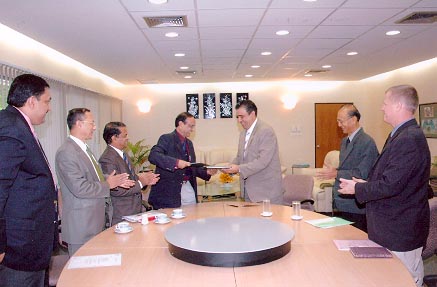
Professor Said Irandoust Assumes AIT Presidency
 |

|

(L-r)Professor Said Irandoust; Incoming AIT President; Acting President Mario Tabucanon; Ambassador Jan Axel Nordlander; and H.E. Mr. Laurent Aublin, Ambassador of France to Thailand, incoming Chairman of the Executive Committee
The Presidency of the Asian Institute of Technology was formally and symbolically
passed from Acting President Mario Tabucanon to Professor Said Irandoust
in a handover ceremony held at the AIT Conference Center on Tuesday, June 28.
The occasion was marked by an Academic Colloquium on 'AIT - Past, Present
and Future', and also included the passing of the Chairmanship of the Executive
Committee from Ambassador Jan Axel Nordlander, now Director General of
the Department for Consular Affairs and Civil Law, Ministry for Foreign Affairs,
Sweden, to H.E. Mr. Laurent Aublin, Ambassador of France to Thailand.
The handover ceremony was the first in the history of AIT.
In his acceptance speech, Professor Irandoust spoke of working for system openness,
mutual respect, compromise, and encouraging risk-takers. He noted also some
of the things that struck him forcibly about AIT - its global cultural awareness,
cross-cultural communication, the value of multi-cultural education, regional
initiatives, (environmental, social, economic) sustainable development, and
that faculty, staff and students are the most important resource of the Institute.
Earlier in the panel discussion, Professor Irandoust had emphasized a commitment
to improving the quality of research at AIT, and he spoke of a need to recognize
and collaborate with other sources of knowledge production. He also emphasized
research at the interface of fields, and interdisciplinary, inter-institutional
teamwork. The panel discussion was chaired by Executive Committee member Professor
Ashoka Chandra, and also included Professor Irandoust, H.E. Mr. Pieter
Marres, Ambassador of the Netherlands, Professor Rolf Dubs, Former
President of University of St. Gallen, H.E. Mr. Shahed Akhtar, Ambassador
of Bangladesh; Professor Anders Flodström, President of the Royal
Institute of Technology, Stockholm; Professor Stephen Hill, Regional
Director, UNESCO Jakarta Office; distinguished AIT alumni Dr. Subin Pinkayan;
and Professor Stephen Ogunlana, Chairman of the AIT Academic Senate.
Each member of the panel spoke to the topic of colloquium, after which the floor
was opened for discussion and questions.

Prof. Mario T. Tabucanon, Acting President, gives an overview on AIT's past and present
At the handover, Acting President Professor Mario Tabucanon spoke of the Presidency
as an obligation, and an office of sanctity. "I am thankful to the Board
of Trustees and to the Executive Committee for giving me the opportunity to
serve as a bridge between the presidency of Professor Jean-Louis Armand and
the presidency of Professor Said Irandoust. The AIT Presidency, Professor Tabucanon
explained, was symbolized by a chain worn by the President at graduation ceremonies.
"I was humbled to wear this chain for the first time on May 27".

Prof. Said Irandoust, left, Incoming President, shares his view at the Academic Colloquium. Also in the photo are Prof. Mario T. Tabucanon, Acting President, and H.E. Mr. Vivek Katju, Ambassador of India to Thailand
Some themes emerging from the panel discussion were the continuing imperative
to establish AIT as a global center of excellence in research, the need to increase
AIT's organizational flexibility and responsiveness to emerging demands in the
face of ever growing competition, the need to ensure that the quality of teaching
at AIT, the importance of values as much as technical knowledge, the importance
of building links with the community, the challenge of teamwork and the need
to reward and recognize team efforts, and AIT's potential to play the role of
a strategic catalyst. Noting these and other excellent points made by the panel,
Professor Tabucanon noted that the challenge was "not in defining where
we want to go, but how to get there".

Prof. Ashoka Chandra chairing the Panel Discussion
Summarizing the afternoon's discussion, Professor Ashoka Chandra noted
that it is always easier to say what is not working than the opposite: "AIT
has a great number of positives and basic strengths". The way forward,
he argued, was "not to be diverted by fixing things. It is far more productive
to pursue a new vision, and to pursue it forcefully".

Scene at the Academic Colloquium

